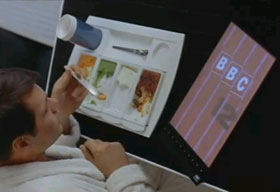|
|
Sci-Fi
Oct 28, 2016 8:31:38 GMT
Post by Barrington on Oct 28, 2016 8:31:38 GMT
This is easy for me to say of course but the story writers particulary in films never predicted our advancement in PC's and mobile phones , the latter you never see in a Sci-Fi films and the PC's are always incredibly dated. Yet other stuff is very futuristic and we don't seem to be anywhere near it. I was watching Blade Runner last night , ok came out in 1982 but its set in 2019 , 37 years was a bit optimistic for advancement to super intelligent androids and off-world activity. Que lots of examples to put me right  |
|
|
|
Sci-Fi
Oct 28, 2016 9:00:58 GMT
Post by zippy on Oct 28, 2016 9:00:58 GMT
Well they used 'ipads' in Star Trek - they got that right.
Also they didn't need mobile phones as they had the com badge, very much like the smart watches of today.
|
|
|
|
Post by MartinT on Oct 28, 2016 11:48:04 GMT
McCoy's medical diagnostic thingy would be useful if a little hopeful.
|
|
|
|
Sci-Fi
Oct 28, 2016 12:36:01 GMT
Post by Slinger on Oct 28, 2016 12:36:01 GMT
Engage geek mode *click* Engage adenoidal speech synthesis *click* Engage 'Actually' generator *click* Actually, I think you'll find that 2001: A Space Odyssey had tablet computers long before Star Trek. Arthur C Clarke called them NewsPads. Clarke also invented the idea of virtual reality games before computer games of any kind had been invented, and Ray Bradbury invented Ear Buds. H.G. Wells predicted Tanks, The Atomic Bomb, and Automatic Doors amongst other things... The real truth is though, many of the ideas posited in science fiction books and films are actually real, but the world government, the Illuminati, and the Venusian Lizard People don't want you to know about them. *click* *click* *click* Seriously though, and I know this thread is supposed to reference films. not books but I'm a rebel,  Check out John Brunner's " Stand On Zanzibar"We now return control of your television set forum to you |
|
|
|
Sci-Fi
Oct 28, 2016 13:12:23 GMT
Post by MartinT on Oct 28, 2016 13:12:23 GMT
The original flat-screen TV in 2001, showing BBC 12...  |
|
|
|
Sci-Fi
Oct 28, 2016 14:12:23 GMT
Post by Barrington on Oct 28, 2016 14:12:23 GMT
Seriously though, and I know this thread is supposed to reference films. not books but I'm a rebel,  Check out John Brunner's " Stand On Zanzibar"No I meant books as well "particularly films" , I don't read Sci-Fi books , but I do love Sci-Fi films. |
|
|
|
Sci-Fi
Oct 28, 2016 17:36:57 GMT
Post by MikeMusic on Oct 28, 2016 17:36:57 GMT
Starcops had "Box"
|
|
|
|
Sci-Fi
Oct 28, 2016 17:45:26 GMT
Post by John on Oct 28, 2016 17:45:26 GMT
Watch Black Mirror TV series if you want to have a glimse where the computer may head
|
|
|
|
Sci-Fi
Oct 28, 2016 22:54:05 GMT
Post by Slinger on Oct 28, 2016 22:54:05 GMT
Some of these I knew already, others I've discovered while looking around the web...
In 1887 credit cards were written about in Looking Backward by Edward Bellamy.
Margaret Cavendish was writing sci-fi about underwater vehicles (submarines) in 1666, in a book called The Blazing World.
Ralph 124C 41+ was the first sci-fi book to give us the concept of radar and video phones. That is, Hugo Gernsback was writing about video-chatting in 1911, before television even existed. And radar wasn't properly invented until 1933, but Gernsback describes detecting objects through waves in great detail.
H. G. Wells never went as far with the hard sci-fi tech stuff as Jules Verne did, but his books were just as influential. The War of the Worlds inspired the first liquid-fueled rocket. The Land Ironclads is all about tanks, before tanks were actually invented. But The World Set Free might be his most chilling prediction, because it's a novel about nuclear warfare written in 1914. He actually uses the phrase "atomic bomb," and describes the devastating effects of radiation.
In The Roads Must Roll, Robert Heinlein accurately predicts "electric staircases" that move automatically, as well as those conveyor belt things you walk on at airports. In 1940, Robert Heinlein wrote the short story “Solution Unsatisfactory,” which posited a future world where America develops an atomic weapon that ends World War II unilaterally. After they use it, it spurs the rest of the world into a nuclear arms race to keep up. The story was written before the United States had even entered World War II and five years before the bombing of Hiroshima and Nagasaki. Heinlein’s vision of mutually assured atomic destruction served as a terrifying blueprint for the Cold War.
The characters in Edward Page Mitchell’s “The Senator’s Daughter,” written in 1879, owned printers in their homes, from which they could access and print current articles and information.
|
|
|
|
Sci-Fi
Oct 28, 2016 23:05:37 GMT
Post by MartinT on Oct 28, 2016 23:05:37 GMT
I love good SF books and good SF films. There are bad kinds, too.
|
|
|
|
Sci-Fi
Oct 28, 2016 23:18:05 GMT
Post by ChrisB on Oct 28, 2016 23:18:05 GMT
Tanks, submarines, helicopters, gliders.....Leonardo was there before all of those Johnny-Come-Lately sci fi authors.
|
|
Deleted
Deleted Member
Posts: 0
|
Sci-Fi
Oct 29, 2016 3:46:52 GMT
Post by Deleted on Oct 29, 2016 3:46:52 GMT
I love good SF books and good SF films. There are bad kinds, too. Ive collected 1960's issue Sci-Fi paper backs for years. Mainly American issues cos i prefer the covers. |
|